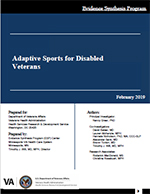
|
Prepared by: Recommended citation: |
Download PDF: Complete Report, Executive Summary, Report, Appendices
The purpose of this report is to systematically review the available evidence on the benefits and harms of adaptive sports participation and the barriers to and facilitators of participation. With input from our Operational Partners and Technical Expert Panel members, the scope of the project was limited to the following medical conditions: amyotrophic lateral sclerosis (ALS), limb amputation, hearing loss or deafness, multiple sclerosis (MS), post-traumatic stress disorder (PTSD), spinal cord disorder, spinal cord injury (SCI), stroke/cerebrovascular accident (CVA), traumatic brain injury (TBI), or visual impairment or blindness.
Key Question 1. What is the effectiveness of participation in adaptive sports programs among individuals with amyotrophic lateral sclerosis (ALS), limb amputation, hearing loss or deafness, multiple sclerosis (MS), post-traumatic stress disorder (PTSD), spinal cord disorder, spinal cord injury (SCI), stroke/cerebrovascular accident (CVA), traumatic brain injury (TBI), or visual impairment or blindness?
Key Question 1a. Does the effectiveness vary by frequency/duration of adaptive sport program participation?
Key Question 1b. Do particular patient groups (ie, age range, gender, race, time since injury, time involved in adaptive sports, type and/or severity of disability) benefit more than others from adaptive sports participation?
Key Question 2. What are the potential harms of participation in adaptive sports programs among individuals with amyotrophic lateral sclerosis (ALS), limb amputation, hearing loss or deafness, multiple sclerosis (MS), post-traumatic stress disorder (PTSD), spinal cord disorder, spinal cord injury (SCI), stroke/cerebrovascular accident (CVA), traumatic brain injury (TBI), or visual impairment or blindness?
Key Question 3. What are the known facilitators of and barriers to the participation in adaptive sports programs among individuals with amyotrophic lateral sclerosis (ALS), limb amputation, hearing loss or deafness, multiple sclerosis (MS), post-traumatic stress disorder (PTSD), spinal cord disorder, spinal cord injury (SCI), stroke/cerebrovascular
Adaptive Sports for Disabled Veterans: Systematic Review (Management eBrief)
Adaptive Sports for Veterans: A Systematic Review of the Evidence (Cyberseminar)